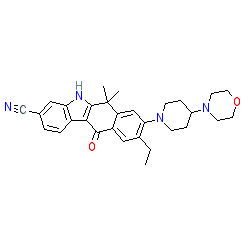GtoPdb is requesting financial support from commercial users. Please see our sustainability page for more information.
|
Synonyms: AF802 | Alecensa® | CH5424802
alectinib is an approved drug (FDA (2015), EMA (2017), Japan (unknown))
Compound class:
Synthetic organic
Comment: Alectinib is a second generation ALK inhibitor. It was developed to inhibit the expression of the mutated ALK gene that causes growth of some non-small cell lung cancers, in patients whose cancer has become resistant to the older ALK inhibitor, crizotinib [2,5]. However, additional mutations may develop which confer alecitinib resistance [1]. Cells harbouring these novel mutations are reported to be sensitive to ceritinib and other next-generation ALK tyrosine kinase inhibitors [1]. The identification of the mechanisms by which acquired tumour resistance occurs highlights the importance of being able to use the correct drug for the correct patient to maximise the clinical benefit [4]
The design and synthesis of alectinib (CH5424802) is described in [2]. Ligand Activity Visualisation ChartsThese are box plot that provide a unique visualisation, summarising all the activity data for a ligand taken from ChEMBL and GtoPdb across multiple targets and species. Click on a plot to see the median, interquartile range, low and high data points. A value of zero indicates that no data are available. A separate chart is created for each target, and where possible the algorithm tries to merge ChEMBL and GtoPdb targets by matching them on name and UniProt accession, for each available species. However, please note that inconsistency in naming of targets may lead to data for the same target being reported across multiple charts. ✖
View more information in the IUPHAR Pharmacology Education Project: alectinib |
|
|||||||||||||||||||||||||||||||||||
| References |
|
1. Katayama R, Friboulet L, Koike S, Lockerman EL, Khan TM, Gainor JF, Iafrate AJ, Takeuchi K, Taiji M, Okuno Y et al.. (2014)
Two novel ALK mutations mediate acquired resistance to the next-generation ALK inhibitor alectinib. Clin Cancer Res, 20 (22): 5686-96. [PMID:25228534] |
|
2. Kinoshita K, Asoh K, Furuichi N, Ito T, Kawada H, Hara S, Ohwada J, Miyagi T, Kobayashi T, Takanashi K et al.. (2012)
Design and synthesis of a highly selective, orally active and potent anaplastic lymphoma kinase inhibitor (CH5424802). Bioorg Med Chem, 20 (3): 1271-80. [PMID:22225917] |
|
3. Kodama T, Tsukaguchi T, Yoshida M, Kondoh O, Sakamoto H. (2014)
Selective ALK inhibitor alectinib with potent antitumor activity in models of crizotinib resistance. Cancer Lett, 351 (2): 215-21. [PMID:24887559] |
|
4. Politi K, Gettinger S. (2014)
Perfect ALKemy: optimizing the use of ALK-directed therapies in lung cancer. Clin Cancer Res, 20 (22): 5576-8. [PMID:25228532] |
|
5. Sakamoto H, Tsukaguchi T, Hiroshima S, Kodama T, Kobayashi T, Fukami TA, Oikawa N, Tsukuda T, Ishii N, Aoki Y. (2011)
CH5424802, a selective ALK inhibitor capable of blocking the resistant gatekeeper mutant. Cancer Cell, 19 (5): 679-90. [PMID:21575866] |
|
6. Sentana-Lledo D, Viray H, Piper-Vallillo AJ, Widick P, Rangachari D, Wilson JL, Gangadharan SP, Aronovitz JA, Berman SM, VanderLaan PA et al.. (2022)
Complete pathologic response to short-course neoadjuvant alectinib in mediastinal node positive (N2) ALK rearranged lung cancer. Lung Cancer, 172: 124-126. [PMID:36075183] |
|
7. Soda M, Choi YL, Enomoto M, Takada S, Yamashita Y, Ishikawa S, Fujiwara S, Watanabe H, Kurashina K, Hatanaka H et al.. (2007)
Identification of the transforming EML4-ALK fusion gene in non-small-cell lung cancer. Nature, 448 (7153): 561-6. [PMID:17625570] |
|
8. Takeuchi K, Choi YL, Togashi Y, Soda M, Hatano S, Inamura K, Takada S, Ueno T, Yamashita Y, Satoh Y et al.. (2009)
KIF5B-ALK, a novel fusion oncokinase identified by an immunohistochemistry-based diagnostic system for ALK-positive lung cancer. Clin Cancer Res, 15 (9): 3143-9. [PMID:19383809] |







